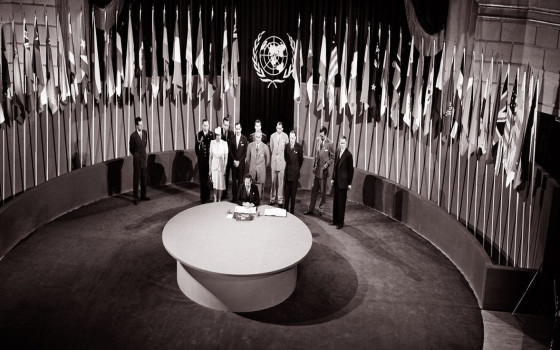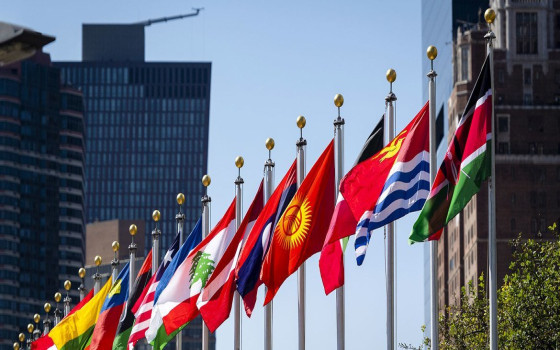The United Nations in its 80th Year: What Has It Achieved? It has addressed issues of human rights, development, peacekeeping, climate, epidemics, and more.

- Europe and Arabs
- Friday , 24 October 2025 10:24 AM GMT
New York: Europe and the Arabs
As the United Nations celebrates its 80th anniversary in 1945, we review how the organization has contributed to shaping international peace, security, development, and human rights, and what this means for the future.
From its founding to the present day, the United Nations has been at the heart of global cooperation. In this article, published in the UN Daily News, UN expert Natalie Samarasinghe discusses the UN's most significant achievements over eight decades, from peacekeeping to the eradication of smallpox, the advancement of women's rights, and the formulation of the Millennium Development Goals, Sustainable Development Goals, and the Paris Climate Agreement.
"In the aftermath of World War II, the United Nations was truly an expression of hope. It was the birth of the international community as we know it today. It was the first time we had expectations of something called common humanity, that we have universal laws and standards, and that the international community should come together and work together to solve the problems we face. I think for people, it represented the idea that there is a universal project and that everyone has a stake in it. That was perhaps the greatest achievement of those early years, creating those expectations that the United Nations, nations, and peoples have tried to live up to ever since.
Human Rights
The Universal Declaration of Human Rights is a document that personalizes the promise of the United Nations to individuals. It embodies the idea that we have a common humanity, a common responsibility to one another. It's really about saying, 'I am affected in a very direct way by the rights violations that diminish someone in a distant country.' That offers a measure of hope for the protection of justice and truth.
Peacekeeping
In those early years, peacekeeping was largely about monitoring an armistice agreement or a troop withdrawal.
That's the model that has been so successful and has helped bring peace to places like Namibia. El Salvador, Colombia, and Sierra Leone.
But I think today it's a model that's becoming more difficult to implement. It's also more difficult to find funding for those missions.
We spend about $7.5 billion a day on war and our militaries. We spend that amount in a year on peacekeeping around the world.
Eradicating Smallpox
Eradicating smallpox was a landmark achievement for the United Nations. It was about engaging the scientific community to develop a vaccine, but also how to mass-produce it, how to store it, and how to transport it. It was a logistical issue.
You also had to have not just doctors and nurses, but also community workers. It was a total community effort.
I think this represents what the United Nations can do at its absolute best.
Women's Rights
The role of the United Nations in promoting women's rights, empowerment, and gender equality has been truly transformative. In 1995, the historic UN Conference on Women was held, during which countries adopted what was called the Beijing Platform for Action.
If we look at the millions of additional girls who not only go to school, but complete 12 years of education.
And if we look at the attention people are now paying to issues like modern slavery, human trafficking, and sexual violence in conflict, we see tremendous advances we've seen over the decades in terms of literacy, political inclusion, and economic integration. I think it's been truly transformative.
The Cold War Remained Cold
One of the criticisms we hear of the UN is that it's a forum for debate. I actually think that's one of its most important functions. It's one of the few places where countries can continue to come together and interact, regardless of how bad their bilateral relations are or whatever issues they're facing.
It forces them to work together. And I think that's prevented things from getting too bad, and perhaps even a nuclear confrontation.
The fact that the Cold War remained cold is something we can give the UN credit for.
Development
The Millennium Development Goals were transformative in many ways. There are a series of very specific goals around which countries can unite.
It means they can align their national priorities and resources with the global endeavor. Having clear, measurable targets also means that people in those countries can then hold their governments accountable in a very specific way, with reference to an international framework.
The number of people living in extreme poverty has been halved. Access to school has grown dramatically, and we have millions more in school. Maternal mortality has been reduced.
I think we've seen what coordinated action around some very specific issues can achieve.
And in the last decade, we've seen the Paris Agreement on climate change and the Sustainable Development Goals. I think the SDGs were one of the highlights of the last decade.
They represented the will of governments to work together, but they were also a massive public consultation and engagement process. People care about what's agreed upon at the UN.
And I think most people know that their government can't solve climate change, and they know that things like misinformation and pandemics cross borders, and there's no way their government can address that alone.
The COVID-19 Pandemic
We saw some of that again during the COVID-19 pandemic, when different parts of society and different parts of the UN came together to say, "This is our plan of action to stop the spread of the virus." The pandemic, testing, and vaccine development, but also how to respond to the economic and social impact of this crisis.
So again, I think it was a really good example of what the United Nations can achieve. And as long as there is a need, we need an organization like the United Nations that can work not just on these individual issues, but also look at the interconnections between them.
The United Nations Remains a Symbol of People's Hope
Ultimately, governments must deliver for their people. The United Nations, multilateralism, is a tool for governments to work for their people.
The United Nations continues to symbolize people's hopes. It did so in 1945 and it does so today. There is a common humanity. There is hope that things can be better than they are now.
It is a very human quality to have the capacity for hope and the will to work together. And that is essentially what the United Nations represents. It is a way for people to place their hope in something bigger than themselves that connects us all.














No Comments Found